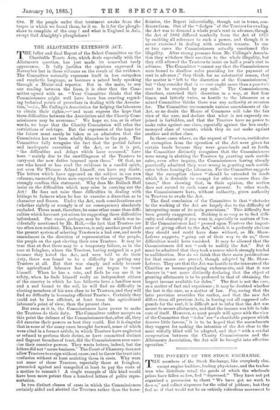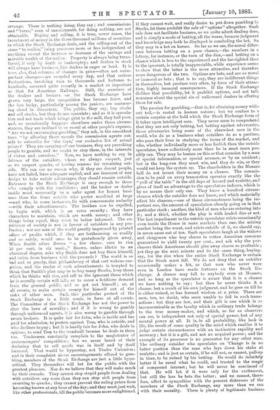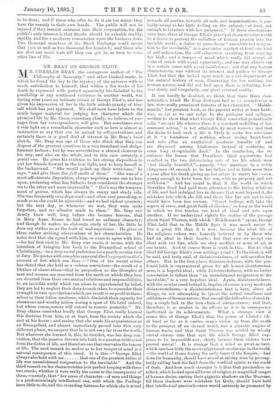THE POVERTY OF THE STOCK EXCHANGE.
THE members of the Stock Exchange, like everybody else, except engine-builders, leading physicians, and the tradesmen who distribute retail the goods of which the wholesale prices have fallen so low, feel " depressed." They have not yet organised a procession to chant " We have got no work to do-o-o," and collect sixpences for the relief of jobbers; but they feel as if that would not be an entirely ridiculous movement to
arrange. There is nothing doing, they say ; and commissions and " turns," even of one-sixteenth, for doing nothing, are not obtainable. Buying and selling, it is true, never cease, the investment of money in the three thousand millions of securities in which the Stock Exchange deals, and the selling-out of the same " to realise," being processes more or less independent of anything except the increase or decrease of the savings and movable wealth of the nation. Property is always being transferred, if only by death or bankruptcy ; and dealers in stock will always have business, like dealers in sugar or land. It is true, also, that columns of changes in price—often not unimportant changes—are recorded every day, and that serious fluctuations, involving ruin to thousands and fortunes to hundreds, occurred quite recently in a market so important as that for American Railways. Still, the numbers of the dealers and brokers on the Stock Exchange have grown very large, the competition has become fierce, and the less lucky, particularly among the juniors, are murmuring aloud in discontent. The public, they say, buy stocks and sell stocks, but they do not speculate; and as it is speculation and not trade which brings grist to tl.e mill, they feel poor, and, as occasionally happens elsewhere under those circumstances, they are inclined to he moral at other people's expense. " Are we not encouraging gambling," they ask, in the smoothest tone, " by allowing those rascals the commission agents outside to subscribe for the tape,' our exclusive list of actual prices ? They are carrying-off our business, they are provoking people to gamble, and we ought to stop them, in the interests of virtue and ourselves." Now, we have nothing to say in defence of the outsiders, whom we always suspect, just as we suspect quacks, of having reasons for remaining outside. We can see no reason why, if they are decent people, have not failed, have adequate capital, and are innocent of any design to take unfair advantages, they should remain outside. Entrance to the Stock Exchange is easy enough to those who comply with the conditions ; and the broker or dealer inside must necessarily be a safer agent for honest business than the firms outside who pester mankind at large —and who, in some instances, lie with consummate audacity —with their advertisements. The insiders can be expelled, to begin with, which is an extra security ; they have characters to maintain, which are worth money ; and other things being equal, they must be better informed. The experience of society is not in favour of outsiders in any profession ; nor are men of the world greatly impressed by printed offers of profits which, if they are forthcoming so readily and so safely, would seem to be gratuitously given away. When Smith offers Brown " a few shares, sure to rise 50 per cent. in six weeks," Brown, unless idiotic to an abnormal degree, asks why Smith does not buy them himself, and retire from business with the proceeds ? The world is so bad and so greedy, that philanthropy of that sort wakens suspicion, and the reader of such advertisements is tempted to think that Smith's plan may be to buy many Stocks, keep those which be thinks will rise, and sell to the ignorant those which he is morally certain will fall ; or to cause a fictitious demand from the general public, and so get out himself ; or, at all events, to make certain money for himself out of the risks of other men. Still, this particular protest of the Stock Exchange is a little comic, in form at all events. The Committee of the Stock Exchange has not the power to alter the laws of morality ; and if it is wrong to gamble through unlicensed agents, it is also wrong to gamble through sworn brokers. It is quite fair for John, who is inside and has paid for admission, to protest against Tom, who is outside, and who declines to pay ; but it is hardly fair for John, who deals in options, to send Tom to the treadmill because he deals in them too. Tradesmen constantly complain to the magistrates of costermongers' competition ; but we never heard of their declaring that to sell goods was in itself and by itself immoral. That would be hypocrisy, not Trades Unionism; and in their complaint about encouragements offered to gambling, members of the Stock Exchange are just a little hypocritical. They themselves will bet for the public with the reatest pleasure. Nor do we believe that they will make much by their crusade. They cannot stop stupid people from dealing with outsiders, any more than they can stop sick people from resorting to quacks ; they cannot prevent the ruling prices from becoming known at any hour of the day; and they must just wait, like other professionals, till the public becomes more enlightened. If they cannot wait, and really desire to pnt down gambling in Stocks, let them prohibit the sale of "options" altogether. Such sale does not facilitate business, as we quite admit dealing does, and is simply a mode of betting, all the worse, because judgment and knowledge may both be displayed in concluding the bet. So they may in a bet on horses. So far as we see, the moral difference between betting on a pure chance,—the numbers in a lottery, for instance, or the turn of the dice,—and betting on a chance which is less to the experienced and the far-sighted than to the ignorant, is totally inappreciable, while experience seems to show that the latter is the more attractive, and therefore more dangerous of the two. Options are bets, and are as moral or immoral as bets ; that is to say, they are indifferent things in themselves, but produce very often, by force of their attraction, highly immoral consequences. If the Stock Exchange dislikes that possibility, let it prohibit options, and not talk nonsense about the special sin of unlicensed dealers in offering them for sale.
The passion for gambling,—that is, for obtaining money without toil,—is rooted in human nature ; but we confess to a certain surprise at the hold which the Stock Exchange form of it takes upon intelligent men. They never seem to comprehend that they are not only betting, but betting against adversaries, those adversaries being some of the shrewdest men in the world, who do as a business what outsiders do as a pastime, who pass their lives in studying the turns of the market, and who, whether individually more or less foolish than the outside speculator, know collectively more than he in most cases possibly can. They may be beaten on this or that occasion by a man of special information, or special acumen, or by an accident ; but in the long-run they must win, and they do win, or they would not keep the system up. The shareholders in the Monaco hell do not invest their money on a chance. The commission to be paid on every transaction operates exactly like the " pull of the table " in the old days of hazard and roulette, and gives of itself an advantage to the speculators indoors, which is by no means their only one. They know a hundred circumstances which the outsider does not know, and which materially affect his chances,—one of those circumstances being the important one, the amount of speculation already going on in that particular stock ; another, the kind of men who are entering into it ; and a third, whether the play is with loaded dice or not. The last impediment to the outside speculator exists occasionally even inside the House in more markets than one, the mining market being the worst, and exists outside of it, we should say, in seven cases out of ten. Such speculators laugh at the widows and clergymen who buy shares in rotten American concerns guaranteed to yield twenty per cent., and ask why the purchasers think Americans should give away shares so profitable ; yet they go the next minute and do the same thing, buying, say, for the rise when the entire Stock Exchange is certain that the Stock must fall. We do not deny that an outsider occasionally makes a hit, or that men who never were even in London have made fortunes on the Stock Exchange. A chance may fall to anybody even at Monaco, and so long as the speculator is aware that it is a chance we have nothing to say ; bnt then he never thinks it a chance, but a result of his own judgment, and he goes on till he is either ruined, or has learned wisdom at a price. There are men, too, no doubt, who seem unable to fail in such transactions ; but they are few, and their gift is one which is as incommunicable as the faculty which in ordinary trade belongs to the true money-maker, and which, so far as observers can see, is independent not only of special power, but of any mental power at all. It is, in all probability, like luck in life, the result of some quality in the mind which enables it to judge certain circumstances with an instinctive rapidity and accuracy ; but it is a gift, and not an acquired power ; and the example of its possessor is no guarantee for any other man. The ordinary outsider who speculates on 'Change is in no better position than the man who lays down his stake at roulette; and is just as certain, if he will not, or cannot, pull-up in time, to be ruined by his betting. He would do infinitely better if he saved what he could, and trusted to the magic of compound interest ; but he will never be convinced of that. He will bet if it were only for the excitement, but still the less he bets the better ; and we cannot, therefore, affect to sympathise with the present distresses of the members of the stock Exchange, any more than we can with their morality. There is plenty of legitimate business to be done; and if those who offer to do it are too many, they have the remedy in their own hands. The public will not be injured if they restrict entrance into their corporation, for the public's only interest is that Stocks should be saleable readily, rapidly, and for a moderate commission upon the business done. Two thousand members of the Stock Exchange could secure that just as well as two thousand five hundred ; and those who are shut out must wait till they can get in, or turn to some other line of life.








































 Previous page
Previous page